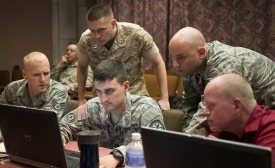isis
It wasn’t the kind of policy statement that would restore Britain to a central role in geopolitical crises. But the announcement that caught my attention in recent days was a smart deployment of soft power, of which the UK has plenty to offer. John Whittingdale, the culture secretary, claimed for Britain a pivotal role in the fight against cultural destruction, which he described as an affront to common human values.
Rarely has amateurism in American foreign policy in the Middle East been as glaring and shocking as it has been in the past year with regard to Washington’s policy toward ISIS. In the United States during the past two weeks I have had the opportunity to follow more closely than usual news, analysis and political discussions about how Washington should respond to the threat of ISIS, and the experience has been frightening.
We have a problem—not a problem from hell, but one that claims to come from heaven. That problem is sometimes called radical, or fundamentalist, Islam, and the self-styled Islamic State is just its latest iteration. But no one really understands it. In the summer of 2014, Major General Michael Nagata, the commander of U.S. special operations forces in the Middle East, admitted as much when talking about the Islamic State, or ISIS. “We do not understand the movement,” he said. “And until we do, we are not going to defeat it.”

David S. Jackson on when trolling gets real.
On the first Friday of each month The Interpreter will publish Digital Diplomacy links instead of the weekly Digital Asia links. As Australian digital diplomacy strives to catch up to the rest of the world, these links will highlight the most creative and effective ways countries are leveraging the internet for foreign policy gain.
U.N.: A military defeat of the Islamic State in Syria and Iraq could scatter extremists around the globe. Would the world be a safer place if the United States and its allies were to defeat the Islamic State in Iraq and Syria? Not necessarily, according to a senior U.N. counterterrorism official. Extremist fighters have proven remarkably adept over the past three decades at transforming themselves at the close of battles.
Schools need both a national strategy and individualised approaches to prevent the radicalisation of students drawn to Islamic State and other extremist groups, an Edith Cowan University counterterrorism researcher says.
The fall of the ancient Syrian city of Palmyra to the Islamic State this week marked an opportunity for the militant group to push its propaganda forward. [...] The militants’ decision to publicize their victory via social media is typical of the group’s strategy as it strives to use the Internet to push its propaganda forward – and it comes as the Obama administration faces increasing scrutiny of its policies for combating the extremist group on both fronts.







